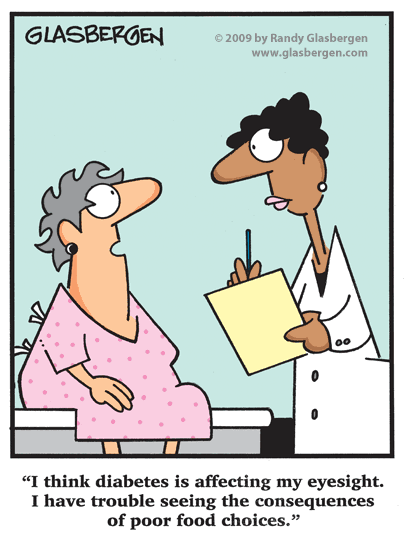
Starts with you
Knowing
the risk of this disease and what can be done to reduce it, could save you from
a life sentence
1.
STOPPING
THIS SILENT KILLER
Diabetes often
has no symptoms. So it’s important that
it be caught at an early stage before it develops into a full blown
disease. The blood glucose levels that are
higher than normal, but not enough for a diagnosis of diabetes is called
pre-diabetic. Pre-diabetic can delay or
prevent the onset of type 2 diabetes through lifestyle changes. A 2001 report published in the New England
Journal of Medicine showed that intensive lifestyle changes involving diet and exercise
resulting in weight loss lowered the risk of developing type 2 diabetes by 58%. The key lifestyle changes are:
·
Eat a healthy
balanced diet
Aim to
eat food low in fat and sugar, and high in fiber, with plenty of fruits and
vegetables.
·
Lose weight if
you are overweight
Getting
to a perfect weight may not be realistic, but losing some weight will help
reduce blood glucose level. The more you
weigh, the more insulin you need. Pancreas
is only able to make limited amount of insulin.
The less you weigh, the more efficient the insulin generated will be.
·
Perform regular
physical activity
Exercise
at least 3 times a week, each session lasting 30 minutes, and aim to increase
your heart rate.
·
Stop smoking
Smoking
increase your diabetes by 50%. Smoking damages
blood vessels, making it harder for your body to heal, increasing the risk of
infections and amputation.
2.
THE
DIABETES-HEART DISEASE CONNECTION
Diabetes and
cardiovascular disease go hand-in-hand. Diabetes
can damage the blood vessels, including the arteries that supply blood to the
brain and heart. This makes it easier
for fatty deposits (plaque) to form in the arteries (atherosclerosis), reducing
blood circulation and driving up blood pressure.
Nerve damage
caused by uncontrolled diabetes doesn’t produce the typical pain of a heart
attack. Sufferers may not feel touch,
vibration, heat or cold on extremities (hand and feet). People with diabetes often have high blood
pressure, which can cause abnormalities in the small blood vessels of the brain
leading to stroke.
3.
DO YOU
HAVE TYPE 2 DIABETES?
Some have no symptoms.
Here are some signs you should look out for:
·
Increased
production of urine and excessive thirst (glucose leaks into urine and pulls
out extra water through the kidneys)
·
Fatigue for
no apparent reason (glucose is not converted into energy)
·
Infection
such as thrush or irritation of the genitals (excessive sugar in the urine
encourages infections)
·
Blurred or
distorted vision (high sugar levels interfere with oxygen delivery to cells in
the retina, thus damaging it)
·
Tingling or
numbness in the hands and feet (over time, uncontrolled blood sugar levels can
damage nerves throughout the body)
·
Slow-healing
sores (diabetes affects the body’s ability to heal)
·
Unexplained
weight gain or loss ( to compensate for lost fluids and sugar, you eat more than
usual and gain weight; or you lose weight because your muscle tissues don’t get
enough glucose to generate growth)
Shared
from article:
By Wan Ker-Hsin
Live Healthy
Shape, November 2007

What an wonderful post. Very nice to read. I very much appreciate the way you have provided extremely useful information about the prevention of diabetes. These days people in general are extremely concerned about diabetes and always on the lookout for an effective solution. Recently I came across a book called "The 7 Steps to Health and the Big Diabetes Lie". Trust me the book practically breaks hundreds of myths related to the disease and provides an effective solution. I have found it extremely useful and effective. Maybe you can also read it out at once.
ReplyDeleteThis is my first time visit to your blog and I am very interested in the articles that you serve. Provide enough knowledge for me. Thank you for sharing useful and don't forget, keep sharing useful info: clave diabetes de javier manera
ReplyDeleteThis comment has been removed by the author.
ReplyDeleteNice information. Diabetes prevalence is high and rising in every country, related by the global rise in the prevalence of obesity and unhealthy lifestyles. Thus making diabetes is the most common metabolic disease in the world. Knowing the risk of this disease, we can do something to prevent and reduce it.
ReplyDeletediabetescentrale.nl
can help